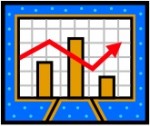 Watching your digital book sales climb is exhilarating. Seeing them fall is heartbreaking and confusing. “What changed?” you ask yourself, feeling panicked. Did I slack off too much on blogging? Or forget to post in the forums? Did I take this success for granted for 24 hours? Frantically, you try to recreate the right combination of effort and luck that made it happen.
Watching your digital book sales climb is exhilarating. Seeing them fall is heartbreaking and confusing. “What changed?” you ask yourself, feeling panicked. Did I slack off too much on blogging? Or forget to post in the forums? Did I take this success for granted for 24 hours? Frantically, you try to recreate the right combination of effort and luck that made it happen.  Read more →
Read more →
 Last October I reduced the price of the first e-book in my Jackson series to $.99 to draw readers in. It was the best move I ever made. Now I’ve dropped the price of The Suicide Effect, a standalone thriller, to draw in new readers who focus more on suspense or thrillers than on mystery/police procedural. Read more →
Last October I reduced the price of the first e-book in my Jackson series to $.99 to draw readers in. It was the best move I ever made. Now I’ve dropped the price of The Suicide Effect, a standalone thriller, to draw in new readers who focus more on suspense or thrillers than on mystery/police procedural. Read more →
I’ve been posting a lot of guest blogs lately, so I thought I’d share the links instead of writing a new blog here. Please check them out. 🙂
Joining the Indie E-Book Revolution: The story behind why I decided to focus on e-books and become an independent author.
In this Q&A, I ask the questions and provide the answers. Find out things about me you didn’t know before.
Here, I discuss the painful choice many authors face between respectability and earning a living. Read more →
 Several readers have e-mailed me and said, “I’d really like to read your e-books, but I don’t how… Which inspired me to put together this list:
Several readers have e-mailed me and said, “I’d really like to read your e-books, but I don’t how… Which inspired me to put together this list:
1. Buy an e-reader: Kindle is the most popular, but there’s also the Nook (Barnes & Noble), Kobo (Borders), Sony Pocket Reader, Pandigital Novel, and many more. When you make your choice, think about more than the device and price. Read more →
I’ve recently joined the e-book revolution both as a novelist and a reader. As a novelist, e-books are allowing me to make a living. As a reader, I’m trying new authors because Kindle lets me download a sample before I buy. The easy access, low prices, and lack of space constraints make downloading e-books a daily temptation. It will be easy to accumulate far more books that I can ever read. But when you can buy a great book for less than $2, who cares? Read more →
With Borders getting into the act, there will soon be four platforms on which authors can self-publish e-books directly to readers. I summarized them for comparison and thought I would share my findings.
Amazon: Digital Text Platform
This venture has been around the longest, has a reported 76% of e-book sales, and publishes content directly to the Kindle bookstore. Read more →
As the Kindle 2 is unveiled, the buzzword in publishing is e-book, e-book, e-book.
It’s the only segment of the industry in which sales are growing, and this phenomenon has some readers worried (“I’ll miss the feel and smell of a new book”) while others are delighted (“The environmental benefits are worth the sacrifice”).
But what does it mean to authors? Speculation on that front is rampant as well.
- “More new authors will be published because the production costs are so minimal.”
- “Author advances will disappear, and it will be more difficult to earn a living as a novelist.”
- “If you don’t have an e-book, you’re missing a whole section of the market.”
All three scenarios could come true.
Another interesting question: Will e-books fall into the same categories—traditionally published versus self-published—that print books do? Will novels from well established e-publishers automatically carry more prestige than an e-book from Author Unknown? I read a post today that stated unequivocally that one of the benefits of publishing an e-book is: “You don’t have to go through the obstacles and headaches involved in finding an agent and a publisher.”
What about distribution? If you don’t go though the headache of finding an e-book publisher, how will anyone find and buy your book? Just because your book is downloadable from your website or for sale on Amazon doesn’t guarantee that you’ll have buyers. The production quality and file choice matter too. You want your e-book to be downloadable to, and nicely displayed on, the major e-readers: Kindle, Sony Reader Digital, and Mobipocket Reader.
I’ve thought about all of this because I’ve considered self-publishing some of my early novels as e-books. Then I decided against it because the benefit would be minimal, and who needs the stigma of being a self-published e-book author? I know that statement will rile some people, but the attitude exists, whether valid or not. Well known authors, on the other hand, could probably do quite well selling e-books from their own websites.
Ultimately, as an author, I want to have all my books available both in print and e-files from traditional publishers with established distribution (and web traffic). But the publishing industry is changing and becoming much less clearly defined. As e-book sales grow and become a sizable chunk of the market, some of the old distinctions may disappear.
What do you think? Are e-books the future? And does it matter who produces them?
